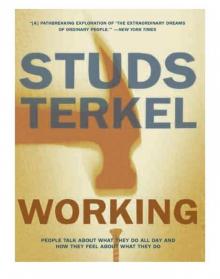- Home
- Studs Terkel
P.S. Page 7
P.S. Read online
Page 7
An explanation is in order. Red Q decided to put Vince on the ABC payroll for the express purpose of easing the way for the network’s visiting firemen, whose faces and voices were so familiar on the TV screen, but who knew from zero about the city they were visiting. Vince knew, not in spades, perhaps, but in blue. He knew every cop who stood guard at the amphitheater, the convention’s arena. What’s more to the point, they all knew him.
So it was Vince who advised the officer at the press gate or mass media gate, or whatever it was called: “Watch me for the high sign. If I shake my head, don’t let ’em in. Got it?”
“Got it, Vince. Whatever you say.”
It came to pass that H. V. Kaltenborn, NBC’s most renowned pundit, accompanied by his producer and assorted gofers, was barreling toward the gate in an NBC special limousine. As is the wont of such Eastern hotshots working the benighted hinterlands, the air was one of towering confidence and, by its very nature, of cool contempt toward the natives. A card was flashed, en passant. But the Red Sea did not part. The cop said, “Just a minute.”
“We’re NBC,” somebody said, clarion clear.
“I said just a minute.”
The officer turned away. He was peering, it appeared, at somebody several yards distant. Somebody short, squat, and squinty-eyed. He waited for a sign. After what seemed an appropriate passage of time, the mysterious figure slowly, and with an air of dolor, shook its head.
“Sorry,” murmured the man in uniform. “Can’t get in.”
“Are you crazy?” A caterwaul in Manhattan nasal. “We’re the National Broadcasting Company! And that’s H. V. Kaltenborn back there!”
“I don’t care if it’s Gabby Hartnett. Ya can’t get in.”
“We must! He’s got an important interview with Senator Taft’s campaign manager. Can’t you read our credentials? N—B—C!”
“I can read. Move to one side, please.”
Another limo was pulling in. Again, the indolent, languorous flash of a card.
“Just a minute.”
“Just a minute? We’re CBS!”
The gentleman in blue turned away. Again, he peered toward the short, squat, squinty-eyed body several yards distant. After what seemed an appropriate passage of time, the mysterious figure slowly, and with an air of dolor, shook its head.
“Sorry. Ya can’t get in.”
“Are you crazy?” Another caterwaul—this one in Scarsdale nasal.
“We’re the Columbia Broadcasting System. Do you know who’s sitting back there? Ed Murrow and Eric Sevareid!”
“I don’t care if it’s Luke Appling and Art Shires. Ya can’t get in.”
“We must! We’ve got an important interview with Eisenhower’s campaign manager. Can’t you read our credentials? C—B—S !”
“I can read. Move to one side, please.”
Another important-looking car was pulling in. Again, a card flashed. The policeman turned away. Once more, he looked for guidance. This time, the short, squat, squinty-eyed man of mystery nodded. Determinedly, quickly.
“Okay, sir. Sorry for the delay.”
The car whizzed by.
Thus it was that ABC scooped its two rivals, again and again and again, during that remarkable convention of 1952. And it was duly honored with plaques and plenty of adulatory ink. It is not that John Daly and Martin Agronsky deserved these tributes less, but that Vincent De Paul Garrity deserved them more.
There’s the story of Taft conceding the nomination to Ike, via ABC. As Vince passed it on to me, it went something like this:
Taft is staying at the Congress Hotel. Or is it the Blackstone? Vince and an engineer, fully equipped, get off at the senator’s floor. They are grabbed by Secret Service men.
“Where do you think you’re goin’?”
“To see the senator.”
As Vince and his colleague are shoved toward the button and “down” is pressed by a hammy hand, he loudly proclaims. Though his voice carries through the corridors, the announcement is casually offered. Its import is thunderous.
Vince’s conversation was always offered in the manner of a proclamation. Except during those moments when he whispered state secrets conspiratorially, hand cupped to mouth—arcane mumblings I never at any time understood.
Vince: Ya know what I mean?
Me: What?
Vince: [Slightly hurt] What I just told ya.
Me: Oh, sure.
Vince: You’re my buddy.
Me: I know.
Vince: My right arm for ya.
Me: Ya don’t have ta.
Vince: [Wistfully] If I only had your law diploma.
Me: It’s just paper.
Vince: Not to me. [Suddenly, hand shoots toward mouth]
See that guy there? Know who that is?
Me: Who?
Vince: Shh! I’ll tell ya later. [index finger of right hand tugs slightly at right eyelid]
He never did tell me.
To the Secret Service men, one of whom has him by the collar: “You know who’s waitin’ to talk to Senator Taft on the other end? Cardinal Stritch.”
The heavy hand falls away. “Stay right here.”
In a moment, one of the SS men returns. A touch of apology. “Okay, go right in.”
In the senator’s room, whatever needs hooking up is hooked up; the telephone is beeped. The senator, stiff and formal, is ready. On the other end is John Daly of ABC. Another coup. As Vince later explains it: “John Daly’s Catholic.”
Consider this Vincentian tale of the same affair. He, Vincent De Paul Garrity, is experiencing some difficulty getting into the amphitheater on the night of Ike’s acceptance speech. The members of the Secret Service are, for some reason, less than appreciative of Vince’s stick-to-itiveness. So he does what comes naturally. He bedecks himself in the uniform of a Chicago policeman. “I was the shortest cop in the history of the force.” He finds himself on the platform. Of course, Ike is in the wings, awaiting the moment.
Do you understand that moment? There is always an anticipatory ten seconds or so, when nobody is quite sure what to do. The nominee is nervous, clutching the papers in his hand, waiting. The network commentators whisper softly, reverently waiting. Millions of Americans are watching, waiting. All is sweaty pomp. Suddenly, there appears on the TV screens, coast to coast, a singularly short, squat, squinty-eyed, bespectacled policeman, leading by the arm a bewildered, baldheaded national hero—toward the ABC microphone. Of course.
Huge figures grab at the cop; he is spirited off the screens. That he is unceremoniously booted out of the hall is of small matter. A friendly member of the local constabulary spirits him back in, so he—seemingly just another face in the crowd—may taste the fruits of his existential heroism.
History may indicate that General Eisenhower, in the year 1952, made his acceptance speech, haltingly, perhaps, but muddling through, into a microphone on which are writ large the letters ABC. Where did Teddy White chronicle that? Do any of those pundits know what time it is?
If you think the above anecdotes are apocryphal, you and I, dear reader, must part company. True, my sole source was Vincent De Paul Garrity himself. Nor will I deny that, at times, he did engage in flights of fancy. I’d be among the doubting Thomases, too, were it not for the fact that Vince and I worked together for two memorable years.
It was a post-midnight radio program, Sounds of the City. It was conceived by the diabolical Red Quinlan. Only a spirit with the soul of a freebooter, gloriously so, would bracket Vincent De Paul Garrity and me. As a mutual friend of times gone by, Chet Roble, reflected: “What a quinella!”
It was a two-hour compote, free form. Our challenge was to capture the after-hours life of this city. Sometimes I worked in the studio, interviewing a writer, perhaps, or One-Arm Cholly, the Mayor of Bughouse Square, or a small-time bird of prey (usually escorted into the studio by Vince as “our wonderful lifelong buddy”). Often there were beeped phone calls to anonymous heroes and heroines: a currency exchan
ge clerk who pressed the alarm button, thus saving his employer fifty thousand dollars.
Me: I guess you’re a hero.
He: I guess I’m an ass. S’pose that button didn’t work.
Me: Would you do it again?
He: Hell, no.
Most often, Vince was elsewhere: on the roof of city hall (how he got there was no business of mine); at the scene of a robbery, no more than thirty seconds after it occurred (how he got there was no business of mine; when I’d ask, the index figure of his right hand tugged ever so slightly at his right eyelid); with a night-shift bridge tender; with an ecdysiast, whom he grandly led into the studio as “the best dancer since Irene Castle.” And when he called in with late news, he would offer it in truly Vincentian fashion: “Ya know who just died?” He’d name an octogenarian banker, intone a soulful eulogy, and add: “Now for some sad news. A small boy was hit by a truck on Ashland Av’noo . . .”
At times, music was playing. On the other end of the phone, Vince was curious.
Me: It’s Mozart.
Vince: How many precincts did he carry?
Nor shall I ever forget the rainy night we wandered into the hotel where I lived as a boy. As I sat in the lobby, talking into engineer Roger Hanson’s mike, nostalgic, wistful, remembering the men long gone, Vince was moist eyed. “Ah, Studs, if these walls could only talk . . .”
“Yeah, Vince . . . ? ” mumbled I, gulping.
“Ah, Studs, how many votes this place could carry . . .”
And when Johnny Groth, star outfielder of the Tigers (and Chicago Latin School alumnus), was seriously beaned by a wayward pitch from Billy Pierce, it was headline news. That very night, the injured Groth called in from his hospital bed. “Everything’s fine, Studs. Tell everybody I’m okay.” It was thoughtful of Johnny to call, but I was bewildered. He was in the intensive care unit.
Me: Is Vince there?
Groth: Yes, he’s right here.
Vince: Your old pal, Johnny Groth, wanted you to have the news first.
I had never in my life met Johnny Groth.
Vince explained it all the next day. Nobody was allowed to see the ballplayer; it was serious.
Me: How’d you get in?
Vince: They barred the door.
Me: How’d you get in, Vince?
Vince: I got a little black satchel and said I was Dr. Garrity, his family’s physician.
Do you still doubt that Vincent De Paul Garrity deserved all the kudos won by the others in ’52? Yeah, that was Vince. But it wasn’t all of him.
One night—was it one o’clock in the morning?—Vince called in from somewhere on West Lake Street. He was phoning in a conversation with a seven-year-old black boy. I remember, word for word, how it went.
Vince: What’re ya doin’ on the streets this late?
Boy: Findin’ bottles.
Vince: You a bottle finder?
Boy: Yeah.
Vince: What do ya want to be when you grow up?
Boy: Dunno.
Vince: A policeman?
Boy: Uh-uh.
Vince: Fireman?
Boy: Uh-uh.
Vince: You wanna be mayor?
Boy: Uh-uh.
Vince: Then what . . . ?
Boy: [Mumbling] Nothin’ but a human bein’.
Vince: [Excited] Say that again.
Boy: [A bit louder] Nothin’ but a human bein’.
Vince: [To me] How do ya like that, Studs?
I liked it fine, Vince. Yeah.
That was some time ago. Vince was some time ago. I miss him.
Frank Tuller, in Memoriam, 1975
FRANK TULLER DIED. So they say. He was an engineer at WFMT. He was the one I saw each day, behind the glass window of the control room, fooling around with all sorts of dials, buttons, and reels of tape. The birth certificate says he was forty-one years old. The hell with the birth certificate. No damn piece of paper is going to tell me how old he was. Old? Let me tell you something: He was no older than Huck Finn. I’ll let you in on something else: He was Huck.
He was one of those rare beings in whom the young boy never died. In the great many of us, the boy is murdered all too soon and we become “responsible men,” solemn, important, and dull. In Frank, the spirit of irrepressible delight was never crushed. Always, he was filled with wonder. It was as though each day he were newly born. Something terribly exciting was happening. Something good. While the others of us groused and mumbled under our breaths about one stupid thing or another, he saw the sun. And it was warming. “Gee!”
At times, one or the other of us would get so mad at him. “Frank, get with it, for God’s sake! People are rotten!” He’d just stand in that damn doorway, freckles and all, the country boy from Kalamazoo. Playing around with the ring of a million and a half keys that dangled from his belt, janitor fashion. Or goofily mussing up his shock of red hair. “You really think so?” He’d look at you in the manner of a small boy, quizzically, with the intimation of a crooked grin. You’d furiously fumble with some of the junk piled high on your desk, hoping he’d go away. No, he’d just stand there, talking about some crazy thing that had nothing to do with what we were talking about. An encounter on his way to work. There were always encounters on his way to work. Or going up in the elevator. Or in the hallway. Something wondrous.
The funny thing is, his non-sequiturial anecdotes turned out to be exactly what we were talking about. Somebody or other was helping somebody else or other out of some jam or other. It was his way of telling you people weren’t that rotten, after all. There was no stopping him. Wearily, you’d lay your head against your hand and look at him. “You should’ve been there, Studs. It was really funny. This old lady was hollering at this poor guy, only she wasn’t mad or anything like that. It just seemed that way, you know what I mean?” You’d mumble inaudibly, get up, and head for the studio, where we had much work to do. He’d follow, his story continuing without pause. “For Chrissake, Frank, let’s get the tape rolling or we’ll be here all night!” “Wait,” he’d say, “lemme finish. You ain’t heard the best part.”
My guests had arrived, but that didn’t stop Frank. He included them in on his marvelous tale, italicizing it with a wink or a light jab. “Watch out for that Studs, know what I mean?” Hand cupped at mouth, a mumble, a conspirational whisper. The Swedish playwright or welfare mother or Hungarian scientist was befuddled, of course. A sudden, astonished audience. Though these guests had no idea what the hell he was talking about, they were entranced as well as mystified. One thing I know: He made them feel more at home than I ever could in a million years. You see, there were no strangers in Frank’s world. No one was alien to him. He was not only full of wonder; he was wonderful.
Take what happened in the elevator. Always. It never failed. You know how people are at the end of a workday, or for that matter any time, cooped in, going up, going down. Silence, the glum sort. Deadpan. Enter Frank. A light laugh is heard. The elderly secretary, the dour one, is now smiling. I have no idea what he mumbled as he gently nudged her. Neither did she. A tap on my shoulder. The whisper. “Know what I mean?” I hadn’t the faintest idea what he meant. But it worked every time.
Down below is the loading platform. The underground. Nobody is allowed to park his car there. Nobody but Frank. There are hotshots all over the place. Now and then one of them tries to get cute and park his Jaguar or Toyota up against the building. It is very convenient. “Beat it, mister.” The maintenance men and janitors, displaced Hungarians, Yugoslavs, Poles, and Appalachians, are adamant. They were impervious to a bribe of any sort when it came to this. But Frank’s Volkswagen was something else. And the only thing he ever gave any of them was his presence. But that was more than enough. On days when he parked elsewhere for some reason or another, they showed their hurt. “Wassamatter, Frank? You don’t like us anymore?”
If you want to call it magic, that’s okay with me. But that wasn’t it at all. Take that cold, dark night somewhere in the West Side ghetto
. There was a meeting in the church basement of the Contract Buyers’ League. Frank and I pulled up in a truck loaded with expensive and heavy recording equipment. There was a gathering of young men on the corner, quite close to us. Were they members of the Vice Lords, or what? They appeared to be glaring at us. Or was it the stuff in the truck? As I ambled into the church to see the people in charge, I heard Frank casually call out, “Hey, will you guys give me a hand?”
The tough-appearing young blacks were busy. Each was carrying something into the church. Frank was telling them where to put the stuff. He and they were giggling. They appeared to be sharing some kind of secret to which nobody else was privy. So help me, I heard one of them address him as Frank, though at no time did he give his name.
The meeting, an exhilarating one, was over. As I was talking to the chairman, I noticed some of the young men hurrying off with the equipment. They were whispering something to one another and laughing softly. As I said, it was very expensive stuff. I excused myself and shuffled after. “Hey, uh, guys . . .” It wasn’t very loud. I doubt whether they heard me. But somebody did. It was Frank, who had reentered to pick up another piece.
“What’s up, Studs?”
“Uh—nothin’. Nothing at all.”
“Oh, I thought I heard you say something.”
“No, I just—forget it.”
Frank’s eyes widened. As though something quite remarkable had occurred to him. He looked at me with just the hint of a funny smile. I looked away.
“Hey, Studs, you didn’t think—did ya?”
“Nah, nah, nah. You kiddin’?” I was staring hard at the design behind the altar. In other days, this Baptist church had been a synagogue. The six-cornered star was hardly visible, but even if it were I’d have had a hard time making it out. Damn! Why doesn’t that Frank go away? I heard a light laugh behind me.

 Will the Circle Be Unbroken?
Will the Circle Be Unbroken? Hard Times
Hard Times Working
Working Touch and Go
Touch and Go P.S.
P.S. The Studs Terkel Reader_My American Century
The Studs Terkel Reader_My American Century